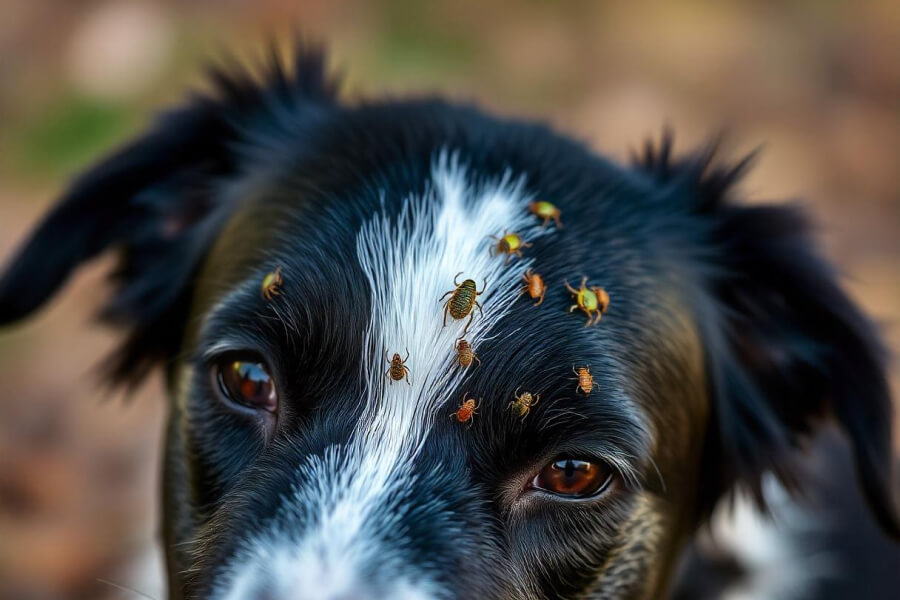As a pet owner, seeing your furry friend suffer from fleas and ticks on pets can be stressful. While conventional treatments are available, many in Spain are searching for natural ways to treat fleas and ticks on pets to avoid the harsh chemicals often found in commercial solutions.
Fortunately, there are many natural options that are both safe and effective. Let’s walk through the best natural remedies for managing fleas and ticks while keeping your pets happy and healthy.
Understanding the Infestation: Fleas and Ticks on Pets
Before exploring solutions, it’s essential to understand how fleas and ticks on pets affect your animals. Fleas are tiny blood-sucking insects that can cause itching, irritation, and even allergic reactions in pets.
Ticks, on the other hand, are known for attaching themselves to your pet and feeding on their blood, potentially spreading dangerous diseases like Lyme disease.
In Spain, the warm climate makes it easy for fleas and ticks on pets to become a year-round problem. These pests can quickly cause discomfort, leading to scratching, skin infections, and other complications.
The best defense is prevention, but it’s also important to have natural remedies on hand when infestations occur.
Exterior Treatment Methods: Protecting Your Yard from Fleas and Ticks
The first step to controlling fleas and ticks on pets is managing your outdoor environment. Fleas and ticks often come from the yard, so it’s important to create a space that repels them.
Tips for Flea and Tick Control
- Trim grass and shrubs: Fleas and ticks thrive in overgrown vegetation. Regularly mowing your lawn and trimming bushes will make your yard less inviting for these pests.
- Create barriers: Use mulch, wood chips, or gravel to form a dry barrier between your lawn and any wooded areas. Fleas and ticks prefer humid environments, and these dry zones discourage them from crossing into your yard.
- Use flea-repellent plants: Consider planting natural repellents like rosemary, lavender, and lemongrass, which can help deter fleas and ticks on pets.
Safe Yard Sprays and Powders
Another effective way to manage fleas and ticks on pets is by using natural yard sprays. Products made with ingredients like cedar oil or neem oil are great for keeping fleas and ticks at bay.
Sprinkling diatomaceous earth around your yard can create an environment that’s unfriendly to pests while being safe for your pets.
How to Keep Fleas and Tricks out of your Home
After securing your yard, it’s equally important to treat the inside of your home to avoid fleas and ticks from settling indoors.
Fleas can multiply quickly, and fleas and ticks on pets can easily spread throughout your living space.
Non-Toxic Home Remedies
For an easy and natural fix, try sprinkling baking soda and salt on your carpets and furniture. These household items help dehydrate flea eggs, preventing them from hatching.
Leave them on the surface for a few hours before vacuuming thoroughly to remove any leftover fleas and ticks.
HEPA Filtration and Vacuuming
Using a vacuum with a HEPA filter is another effective way to manage fleas and ticks on pets. Vacuuming regularly removes flea eggs, larvae, and adult fleas from carpets, bedding, and furniture.
Be sure to vacuum areas where your pets frequent, and empty the vacuum bag outside to prevent re-infestation.
Essential Oil Diffusion
Essential oils like lavender, eucalyptus, and peppermint can be used in a diffuser to repel fleas and ticks on pets naturally. Be sure to use oils that are pet-safe, and diffuse them in areas where your pets spend the most time.
Pet-Friendly DIY Solutions: Treating Fleas and Ticks on Pets Naturally
Once your home and yard are protected, it’s time to focus on treating fleas and ticks on pets directly. There are several natural remedies that can help keep your pets pest-free without the use of harsh chemicals.
Homemade Flea Collars and Sprays
You can create a simple, homemade flea collar by soaking a fabric collar in a mixture of apple cider vinegar and water. This will naturally repel fleas and ticks on pets while being gentle on their skin.
Another option is to make a flea spray using lemon juice, witch hazel, and water, which can be applied directly to your pet’s fur.
Herbal Baths and Skin Treatments
A herbal flea bath using rosemary or eucalyptus is a soothing and natural way to treat fleas and ticks on pets. These herbs help kill fleas on contact while offering a pleasant scent for both you and your pet.
After the bath, applying coconut oil or aloe vera to any irritated skin can help soothe bites and prevent further itching.
Natural Flea Combs and Shampoos
Using a flea comb regularly is another effective, chemical-free way to remove fleas from your pet’s fur.
Choose a fine-toothed comb designed specifically for fleas and ticks on pets, and comb through your pet’s fur carefully.
You can also use natural flea shampoos containing oatmeal and essential oils for gentle flea control during bath time.
Diet Recommendations for Flea and Tick Prevention
Diet plays a significant role in protecting your pet from fleas and ticks. A healthy immune system can naturally repel pests, making your pet less attractive to fleas and ticks.
Evaluating Organic Flea Control Supplements
Consider adding brewer’s yeast or omega-3 fatty acids to your pet’s diet. These supplements are known to improve coat and skin health, which can help deter fleas and ticks on pets. Always consult with your vet before introducing new supplements.
Herbal Flea and Tick Treatments
Herbs like neem and clove are natural flea repellents that can be used topically or added to your pet’s diet. Neem oil, in particular, has been used for centuries to treat skin infections and repel fleas and ticks on pets.
Nutritional Tips for Immune Health
A diet rich in antioxidants and vitamins supports immune health, making it harder for fleas to infest your pet.
Foods like carrots, blueberries, and pumpkins are great additions to your pet’s meals to boost their immune system naturally.
CBD for Fleas and Ticks
CBD can support pets in managing fleas and ticks by promoting overall health, reducing inflammation, and soothing irritated skin from bites.
While there’s no direct evidence that CBD repels fleas or ticks, its anti-inflammatory and calming effects may help reduce discomfort caused by these pests.
It’s best to use CBD alongside proven flea and tick prevention methods, such as natural repellents and regular grooming.
Always consult a veterinarian before introducing CBD into your pet’s routine to ensure it’s safe and suitable for their needs.
Preventive Measures for Long-Term Flea and Tick Control
After treating fleas and ticks on pets, it’s important to adopt preventive measures to keep your home and pets pest-free in the long run.
Consistent Grooming Practices
Grooming plays a major role in keeping fleas and ticks on pets under control. Regularly brushing and bathing your pets will help catch infestations early and prevent pests from settling in.
It’s also a good idea to check for ticks after your pets spend time outdoors, especially if you live in a high-risk area.
Regular Yard Maintenance
Maintaining your yard through regular mowing, trimming, and the use of natural repellents is key to preventing fleas and ticks on pets. Stay awake during warmer months when fleas and ticks are most active.
Consultation with a Holistic Veterinarian
For more tailored advice, consider consulting a holistic veterinarian. These professionals can recommend natural remedies and preventive measures specifically designed for your pet’s needs, ensuring they stay protected from fleas and ticks without exposure to harmful chemicals.
Conclusion
Managing fleas and ticks on pets naturally doesn’t have to be complicated. By taking preventive measures, using natural remedies like herbal baths and flea combs, and keeping your home and yard pest-free, you can protect your pets without the need for toxic chemicals.
Remember to stay consistent with these practices, and your pet will enjoy a healthy, happy, and flea-free life!
FAQs
What naturally kills fleas and ticks on dogs?
Apple cider vinegar, diatomaceous earth, and essential oils like cedar and lavender are effective natural remedies for fleas and ticks on pets.
What is the best homemade flea and tick spray?
A mix of lemon juice, water, and witch hazel is an excellent DIY flea and tick spray for pets.
What kills fleas on dogs immediately?
A herbal bath with rosemary or eucalyptus can kill fleas on contact, offering immediate relief from fleas and ticks on pets.
What household product kills fleas and ticks?
Baking soda and salt can be sprinkled on carpets and furniture to kill flea eggs and larvae, helping control fleas and ticks on pets.







